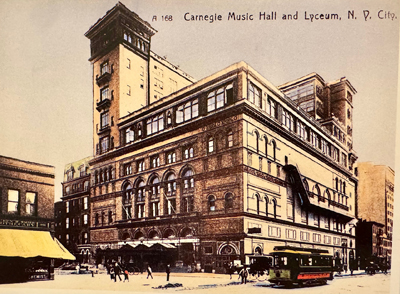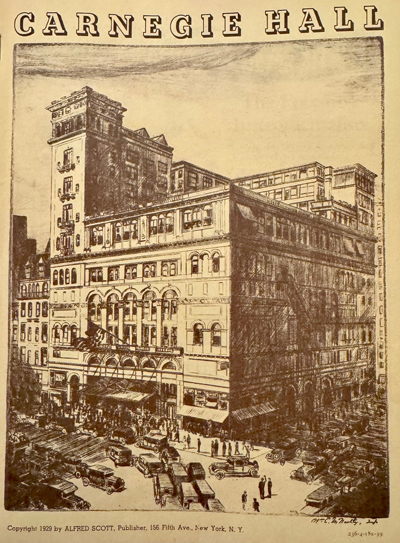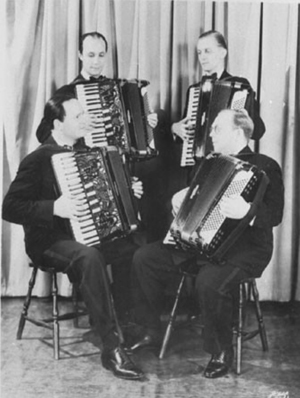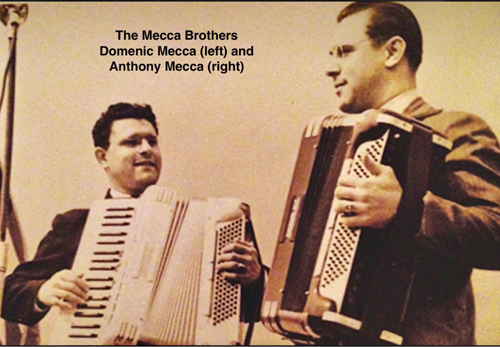
By Joan Grauman Morse
AAA Historian


Many, many years have passed since the late 1930s. Most of us do not remember a time when the piano accordion was still being “designed and tweaked”, and when musical notation for the accordion was not standardized. The piano accordion was a new instrument. It was featured in Vaudeville as an elaborately decorated musical instrument that played folk music and lovely novelty pieces composed strictly for the accordion by Pietro Frosini and others. Soon came the “Golden Age of the Radio”, and Vaudeville faded out. The radio was the place to be for the accomplished accordionists, especially in the New York City area.
Click each picture to see full sizeOne of the most well-known accordionists of the time was Charles Magnante. Magnante was earning a living as an accordionist by the time he was 14 years old. By the mid-1930s, he and others were regularly playing accordion in the radio studios, mostly in New York City. Magnante had a dream for many years: he wanted to bring the piano accordion to the stage in the prestigious Carnegie Hall in New York City. If he could do this, then perhaps the country would finally accept the accordion as a serious classical instrument.
But first, Magnante and eleven other accordion teachers, performers and aficionados decided that what the country really needed was an accordion association. On March 9, 1938, the American Accordionists’ Association (AAA) was founded. These enthusiastic founders immediately got to work: they standardized bass notation, wrote instruction books, created accordion schools, and the list goes on. Magnante felt it was time to head to Carnegie Hall.
On April 18, 1939, one year after the founding of the AAA, Charles Magnante’s dream came to fruition! 3000 people came, in inclement weather, to hear the accordion in Carnegie Hall! The stars were the Magnante Quartet: (picture below l-r) Charle Magnante, Joe Biviano, Gene Von Hallberg and Abe Goldman — all founders of the AAA. They performed together, then Magnante played a few solos, followed by duets with Joe Biviano. Then, more from the Quartet and also from two very talented young brothers (students of Joe Biviano), Anthony and Dominic Mecca.
 The evening ended with the Quartet playing “Mardi Gras” by Ferde Grofe, Magnante’s Accordiana, and a medley of Gershwin tunes. The rousing standing ovation and the critics’ rave reviews were a huge shot in the arm for the versatile piano accordion!! Words from someone who attended that concert:
The evening ended with the Quartet playing “Mardi Gras” by Ferde Grofe, Magnante’s Accordiana, and a medley of Gershwin tunes. The rousing standing ovation and the critics’ rave reviews were a huge shot in the arm for the versatile piano accordion!! Words from someone who attended that concert:
I met Gerry Hertel several years ago at an AAA festival. He was a kind and articulate man in his 90s who, at that time, was performing with the Connecticut Accordion Orchestra. He approached me to tell me about “the most exciting day of his life”. He was given a gift for his upcoming 16th birthday: a ticket to Carnegie Hall to hear the Magnante Concert!! He was so excited that he did not remember the bad weather. Gerry loved every moment of the evening!
 In his words, “When the Quartet came on stage, I thought I was seeing a God because Charles Magnante was so highly regarded. There was also Joe Biviano who had several original novelties that we students tried to play well. The Mecca brothers from Waterbury, Connecticut also played two duets flawlessly. The concert was fantastic and entertaining. I don’t remember any whistling or screaming, only appreciative long applause – for each piece!”
In his words, “When the Quartet came on stage, I thought I was seeing a God because Charles Magnante was so highly regarded. There was also Joe Biviano who had several original novelties that we students tried to play well. The Mecca brothers from Waterbury, Connecticut also played two duets flawlessly. The concert was fantastic and entertaining. I don’t remember any whistling or screaming, only appreciative long applause – for each piece!”
Since that day in 1939, many accordionists have played at Carnegie Hall, and mostly in the recital hall. Being on the main stage was reserved for only a few.
I am very pleased to be writing this article today because, on February 20, 2025, the terrific accordionist Stas Venglevski will be performing on the main stage of Carnegie Hall! He will play solo for the first half and, after intermission, he will be soloing with the New York Chamber Players Orchestra, conducted by Franci Giacomo, performing his original composition, Rondo-Fantasy. Check out the March Accordion USA News for an extensive review of this concert by Editor Rita Barnea.
2026 AAA 88th Anniversary Festival Daily ReportsAugust 13-16, 2026 Latest NewsAn Accordion Extravaganza! exciting concert, April 26th, NY. 2026 AAA Elsie M. Bennett Composition Competition 2025 AAA Elsie M. Bennett Composition Competition Results AAA History ArticlesHistorical Articles about the AAA by AAA Historian Joan Grauman Morse Music CommissionsHistorical and analytical articles by Robert Young McMahan. Recent articles:
AAA NewslettersLatest newsletters are now online. |